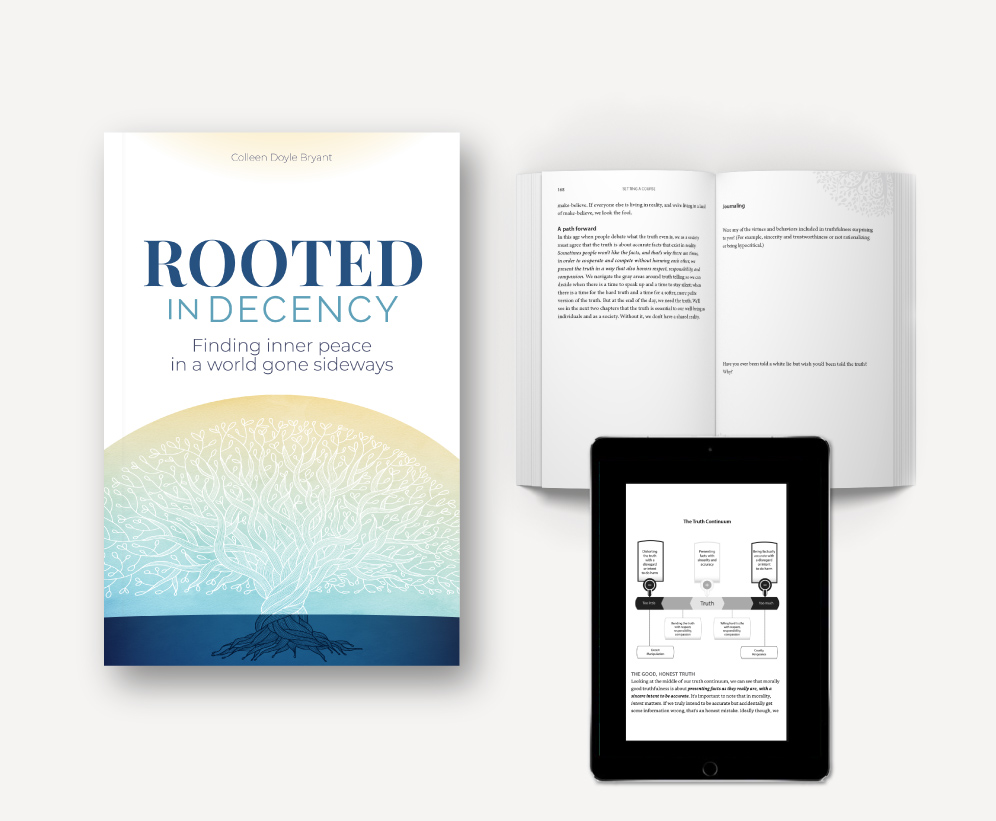Chapters
Curious about what you’ll find in the book, Rooted in Decency? Get a feel for the book and the journey it'll take you through with an excerpt from the introduction, and expandable Table of Contents, and sample chapters below.
Introduction
Table of Contents
Sample Chapters
Introduction
Read an excerpt from the introduction of Rooted in Decency that explains how the book progresses from Looking Within, to Looking Outward, to Setting a Course toward a clear moral compass and shared values.
Mapping the route
The journey starts with you, and then expands outward, so that’s how this book is structured:
Part one looks to the personal self and why we feel off-balance.
We’ll look at how modern life contributes to feelings of personal instability and how intentionally minimizing extremes in the ways we think, feel, and find fulfillment can immediately help us feel more steady. In the end, we’ll see that being rooted in decency—living life in-line with what you think is right—builds an inner self-respect that is not easily swayed by circumstance.
Part two looks at how we’re not just individuals, but individuals who live in a society.
We’ll look at why we voluntarily limit our own freedoms and control our own behavior in order to gain the benefits of living in a group. The current culture of nasty divisiveness and self-absorption runs counter to our own best interest and to the evolutionary wisdom humans have gained about how to live well together. We’ll look at some of the biological and cultural reasons today’s Us versus Them atmosphere is so powerful and we’ll consider some ways to change it. By the end of the section, we’ll see how we don’t have to be perfect, but by simply being decent, we can create ripple effects that come rolling back to improve our world.
Part three explores the question: What does it mean to be a decent person?
In a time when so many people think they’re “right” while so many others think they’re “wrong,” we’ll look to history and world belief systems to find common values that have guided human behavior for thousands of years. We’ll use those values to create a moral compass, viewed through a modern perspective, that enables each of us to make decisions that are rooted in decency.
©2022 Colleen Doyle Bryant, reprinted with the author's permission.
Explore the Table of Contents
1. Finding Lasting Happiness
Why happiness comes and goes, and how that’s a good thing.
2. Mindless Thinking
How extreme thinking is knocking us off-balance
3. The Body's Language
How there’s a positive side to “negative” emotions
4. Spirited Connection
How feeding your spirit includes a side dish of happiness and meaning
5. Self-Respect vs. Self-Esteem
Why it’s good to feel bad sometimes
6. You be You—Unless You’re a Jerk
Why we voluntarily give up some freedoms to be part of society
7. Competing Moral Priorities
Why people think they’re “right” when others think they’re “wrong”
8. Us Versus Them
How group identity isn’t the real problem - Read a sample
9. The Contagion of Cruelty and Kindness
In a world with so much negativity, why bother trying?
10. The Myth of Perfection
Why life is a series of moments for practicing who you want to be
11. Right and Wrong
Where do moral values come from?
12. Shared Values
Which values do the world's belief systems have in common?
13. Defining a Moral Compass
What are your guiding principles?
14. What is Truth?
Why we paint the truth in shades of gray - Read a sample
15. Trust Me
Why the truth still matters
16. The Post-Truth Con
Why people lie and why we’re willing to believe them
17. What is Respect?
How too little and too much respect are destabilizing society - Read a sample
18. Working Against Ourselves
Why you can't disrespect (or shame) someone into agreeing with you
19. What is Responsibility?
Why responsibility is a blend of empowerment and justice
20. Life After Victimhood
How to move society past a grievance state
21. What is Compassion?
Why compassion is not about eliminating suffering
22. The Bright Side
How a little perspective changes everything
Ready to Get Reading?
Buy the print or ebook and start your journey.





